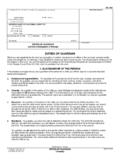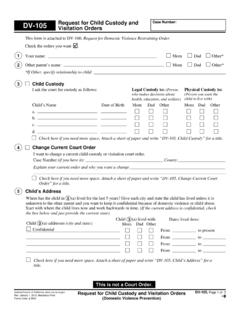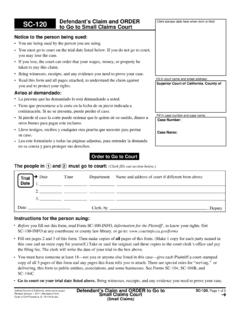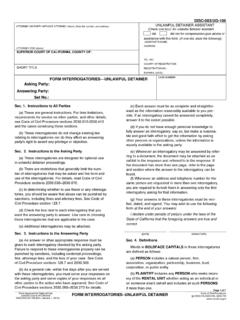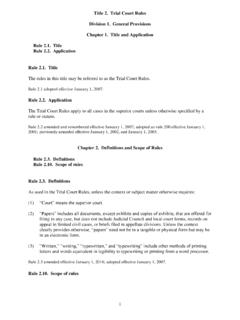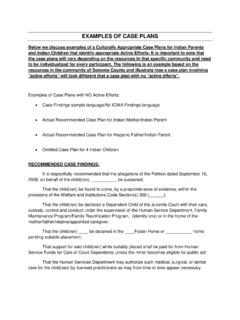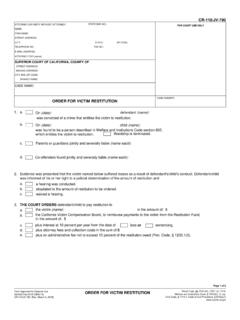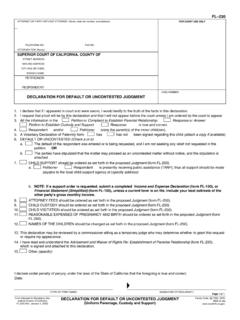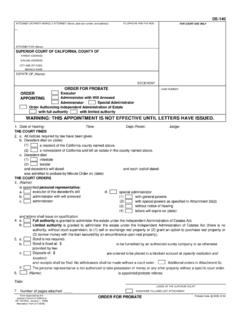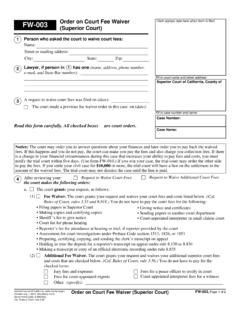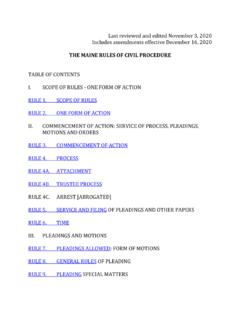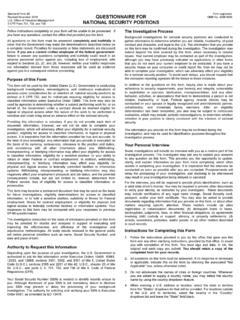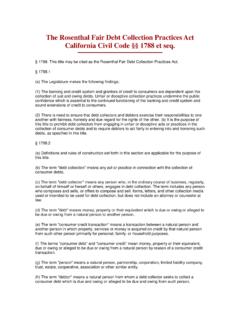Transcription of Title 7. Probate Rules Chapter 1. General Provisions
1 1 Title 7. Probate Rules Chapter 1. General Provisions Rule Probate Rules Rule Preliminary Provisions Rule Definitions and use of terms Rule Waiver of Rules in Probate proceedings Rule Waivers of court fees in decedents estates, conservatorships, and guardianships Rule Ex parte communications in proceedings under the Probate Code and certain other proceedings Rule Probate Rules The Rules in this Title may be referred to as the Probate Rules . Rule adopted effective January 1, 2007. Rule Preliminary Provisions (a) Application of Rules The Rules in this Title apply to every action and proceeding to which the Probate Code applies and, unless they are elsewhere explicitly made applicable, do not apply to any other action or proceeding.
2 (Subd (a) amended effective January 1, 2007.) (b) Purpose of Rules The Rules in this Title are designed to implement the purposes of the Probate law by promoting uniformity in practice and procedure. (Subd (b) amended effective January 1, 2007.) (c) Rules of construction Unless the context otherwise requires, these preliminary Provisions and the following Rules of construction govern the construction of the Rules in this Title : (1) To the extent that the Rules in this Title are substantially the same as existing statutory Provisions relating to the same subject matter, they must be construed as a restatement and a continuation of those statutes; and 2 (2) To the extent that the Rules in this Title may add to existing statutory Provisions relating to the same subject matter, they must be construed so as to implement the purposes of the Probate law.
3 (Subd (c) amended effective January 1, 2007; previously amended effective January 1, 2003.) (d) Jurisdiction The Rules in this Title are not intended to expand, limit, or restrict the jurisdiction of the court in proceedings under the Probate Code. (Subd (d) adopted effective January 1, 2003.) Rule amended and renumbered effective January 1, 2007; adopted as rule effective January 1, 2000; previously amended effective January 1, 2003. Rule Definitions and use of terms As used in the Rules in this Title , unless the context or subject matter otherwise requires: (1) The definitions in division 1, part 2 of the Probate Code apply. (2) Pleading means a contest, answer, petition, application, objection, response , statement of interest, report, or account filed in proceedings under the Probate Code.
4 (3) Amended pleading means a pleading that completely restates and supersedes the pleading it amends for all purposes. (4) Amendment to a pleading means a pleading that modifies another pleading and alleges facts or requests relief materially different from the facts alleged or the relief requested in the modified pleading. An amendment to a pleading does not restate or supersede the modified pleading but must be read together with that pleading. (5) Supplement to a pleading and supplement mean a pleading that modifies another pleading but does not allege facts or request relief materially different from the facts alleged or the relief requested in the supplemented pleading.
5 A supplement to a pleading may add information to or may correct omissions in the modified pleading. Rule amended and renumbered effective January 1, 2007; adopted as rule effective January 1, 2000; previously amended effective January 1, 2002, and January 1, 2003. 3 Rule Waiver of Rules in Probate proceedings The court for good cause may waive the application of the Rules in this Title in an individual case. Rule renumbered effective January 1, 2007; adopted as rule effective January 1, 2000; previously amended effective January 1, 2003. Rule Waivers of court fees in decedents estates, conservatorships, and guardianships (a) Scope of rule This rule governs initial fee waivers, as defined in rule (b), that are requested by petitioners for the appointment of fiduciaries, or by fiduciaries after their appointment, in decedents estates, conservatorships, and guardianships under the Probate Code.
6 The rule also governs initial fee waivers in other civil actions or proceedings in which conservators or guardians are parties representing the interests of their conservatees or wards. (b) Court fee waiver requested by a petitioner for the appointment of a conservator or guardian of the person, estate, or person and estate of a conservatee or ward A petitioner for the appointment of a conservator or guardian of the person, estate, or person and estate of a conservatee or ward must base an application for an initial fee waiver on the personal financial condition of the proposed conservatee or ward. (c) Court fee waiver requested by a petitioner for the appointment of a personal representative of a decedent s estate A petitioner for the appointment of a personal representative of a decedent s estate must base an application for an initial fee waiver on the petitioner s personal financial condition.
7 (d) Effect of appointment of a personal representative of a decedent s estate on a court fee waiver The appointment of a personal representative of a decedent s estate may be a change of financial condition for fee waiver purposes under Government Code section 68636 in accordance with the following: (1) If the successful petitioner is an appointed personal representative: (A) The petitioner s continued eligibility for an initial fee waiver must be based on the combined financial condition of the petitioner and the decedent s estate. 4 (B) Upon marshaling or collecting assets of the decedent s estate following the petitioner s appointment and qualification as personal representative, the petitioner must notify the court of a change in financial condition under Government Code section 68636(a) that may affect his or her ability to pay all or a portion of the waived court fees and costs.
8 (C) The court may make a preliminary determination under Government Code section 68636(b) that the petitioner s appointment as fiduciary is a change of financial condition that makes the petitioner no longer eligible for an initial fee waiver based, in whole or in part, on the estimates of estate value and income contained in the petitioner s Petition for Probate . In that event, the court must give notice and conduct the hearing required by section 68636(b). (2) If the successful petitioner is not an appointed personal representative: (A) An initial fee waiver for that petitioner continues in effect according to its terms for subsequent fees incurred by that petitioner in the proceeding solely in his or her individual capacity.
9 (B) The appointed personal representative may apply for an initial fee waiver. The application must be based on the combined financial condition of the personal representative and the decedent s estate. (e) Financial condition of the conservatee or ward (1) The financial condition of the conservatee or ward for purposes of this rule includes: (A) The financial condition to the extent of the information known or reasonably available to the conservator or guardian, or the petitioner for the conservator s or guardian s appointment, upon reasonable inquiry of any person who has a duty to support the conservatee or ward, including a spouse, registered domestic partner, or parent. A divorced spouse s or divorced registered domestic partner s duty to support a conservatee and a parent s duty to support a ward under this subparagraph is limited to the amount of support ordered by a court.
10 Consideration of a support order as an element of the conservatee s or ward s financial condition under this rule is subject to the Provisions of Government Code sections 68637(d) and (e), concerning the likelihood that the obligated person will pay all or any portion of the support ordered by the court; 5 (B) A conservatee s interest in community property that is outside the conservatorship estate and under the management or control of the conservatee s spouse or registered domestic partner; and (C) The right to receive support, income, or other distributions from a trust or under a contract. (2) Following the appointment of a conservator or guardian and the grant of an initial fee waiver based on the financial condition of the conservatee or ward, the conservator or guardian is the person who received the initial fee waiver for purposes of Government Code section 68636(a), whether or not he or she was the successful applicant for the initial waiver.
